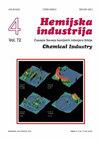Global sensitivity analyses of a neural networks model for a flotation circuit
IF 0.8
4区 工程技术
Q4 ENGINEERING, CHEMICAL
引用次数: 5
Abstract
Modeling of flotation processes is complex due to the large number of variables involved and the lack of knowledge on the impact of operational parameters on the response(s), and given this problem, machine learning algorithms emerge as an alternative interesting when modeling dynamic processes. In this work, different artificial neural network (ANN) architectures for modeling the mineral concentrate in a rougher-cleaner-scavenger (RCS) circuit based on the main process variables are generated (variables as the recovery of the rougher, cleaner and scavenger cells, along with disaggregated variables). Analysis of the global sensitivity was performed to study the importance of the individual and joint performances of the stages of the flotation circuit, reflected by sensitivity indicators that allow to infer the impact that the stages and operational parameters produce on the dependent variables (mineral concentrate in rougher, cleaner and scavenger cells, in addition to the global concentration in the RCS circuit). It should be noted that the ANN is a useful tool for modeling dynamic systems such as flotation, while sensitivity analysis shows that the operation of the three threads turns out to be crucial for the subsequent evaluation of the circuit, while the Unbundled variables that most interact with the overall recovery are gas flow rate, bubble and particle diameters, bubble velocity, particle density, and surface tension.浮选回路神经网络模型的全局灵敏度分析
浮选过程的建模是复杂的,因为涉及大量的变量,并且缺乏关于操作参数对响应影响的知识。鉴于这个问题,机器学习算法在建模动态过程时成为一种有趣的替代方法。在这项工作中,基于主要过程变量(粗选机、清洁器和清除器单元的回收率等变量,以及分解变量),生成了用于对粗选机-清洁器-清除器(RCS)回路中的精矿进行建模的不同人工神经网络(ANN)架构。对全局灵敏度进行了分析,以研究浮选回路各阶段的单独和联合性能的重要性,灵敏度指标反映了这一点,该指标允许推断阶段和操作参数对因变量(除RCS回路中的整体浓度外,粗选、清洁和清除剂池中的矿物浓缩物)产生的影响。应该注意的是,人工神经网络是建模浮选等动态系统的有用工具,而灵敏度分析表明,三个线程的操作对回路的后续评估至关重要,而与总回收率最相互作用的未绑定变量是气体流速、气泡和颗粒直径、气泡速度、颗粒密度,和表面张力。
本文章由计算机程序翻译,如有差异,请以英文原文为准。
求助全文
约1分钟内获得全文
求助全文
来源期刊

Hemijska Industrija
工程技术-工程:化工
CiteScore
1.60
自引率
11.10%
发文量
12
审稿时长
6-12 weeks
期刊介绍:
The Journal Hemijska industrija (abbreviation Hem. Ind.) is publishing papers in the field of Chemical Engineering (Transport phenomena; Process Modeling, Simulation and Optimization; Thermodynamics; Separation Processes; Reactor Engineering; Electrochemical Engineering; Petrochemical Engineering), Biochemical Engineering (Bioreactors; Protein Engineering; Kinetics of Bioprocesses), Engineering of Materials (Polymers; Metal materials; Non-metal materials; Biomaterials), Environmental Engineeringand Applied Chemistry. The journal is published bimonthly by the Association of Chemical Engineers of Serbia (a member of EFCE - European Federation of Chemical Engineering). In addition to professional articles of importance to industry, scientific research papers are published, not only from our country but from all over the world. It also contains topics such as business news, science and technology news, information on new apparatus and equipment, and articles on environmental protection.
 求助内容:
求助内容: 应助结果提醒方式:
应助结果提醒方式:


